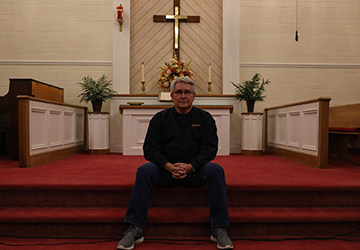
Phil Bowers, founder and executive director of Sustainable Alamance, runs the organization out of Beverly Hills United Church of Christ in Burlington, where he is also a pastor. Photo by Anton L. Delgado.
When Dwayne Daughtry meets someone for the first time, it rarely starts with an introduction.
“Every day I feel like I’m reliving my crime all over again,” Daughtry said. “When people talk to me, the first thing they want to hear about is what I did — not what I do or who I am.”
In 2011, Daughtry was charged with sexual battery — the only misdemeanor that leads to being listed as a sex offender. Other offenses that end with registration range from possession of child pornography to rape.
The federal government requires law enforcement to make the personal information of an offender — name, race, sex, height, weight, address, birthday, scars, marks, tattoos, eye and hair color — public.
Daughtry and more than 25,600 people are listed on North Carolina’s Sex Offender Registry. In 2019, just over 1,300 registrants were added, which is more than any other year in the last two decades.
Alamance County is home to 390 registrants as of this February. This is the ninth highest concentration of sex offenders in the state; on average there are 185 registrants per county.
Every day, a registrant walks into Lt. Bray McAteer’s office, shakes his hand and asks for help. As the deputy in charge of the Sheriff’s Office’s Special Victims Unit, McAteer and his eight-person team monitor the registered offenders in Alamance County.
“You’ve got people on the registry that are true predators. But you also have guys that are 18 or 19 years old — a senior in high school who slept with a freshman — and they have to deal with the exact same things as a pedophile or a rapist,” McAteer said. “I’ve been doing the sex offender registry for four years now, and to be honest, there’s not a lot out there for them.”
While the public registry is intended to keep the community safe, researchers have questioned its effectiveness. Social policy studies have found that the difficulties offenders face as a result of the registry can lead to recidivism, the tendency of a convicted criminal to reoffend.
Left disadvantaged by the public registry and without a state-funded support structure, local offenders rely on community organizations for guidance.
Post-registration, or during parole, most offenders are court-ordered to take classes focused on reducing potential recidivism. These classes are neither free nor taught in Alamance County.
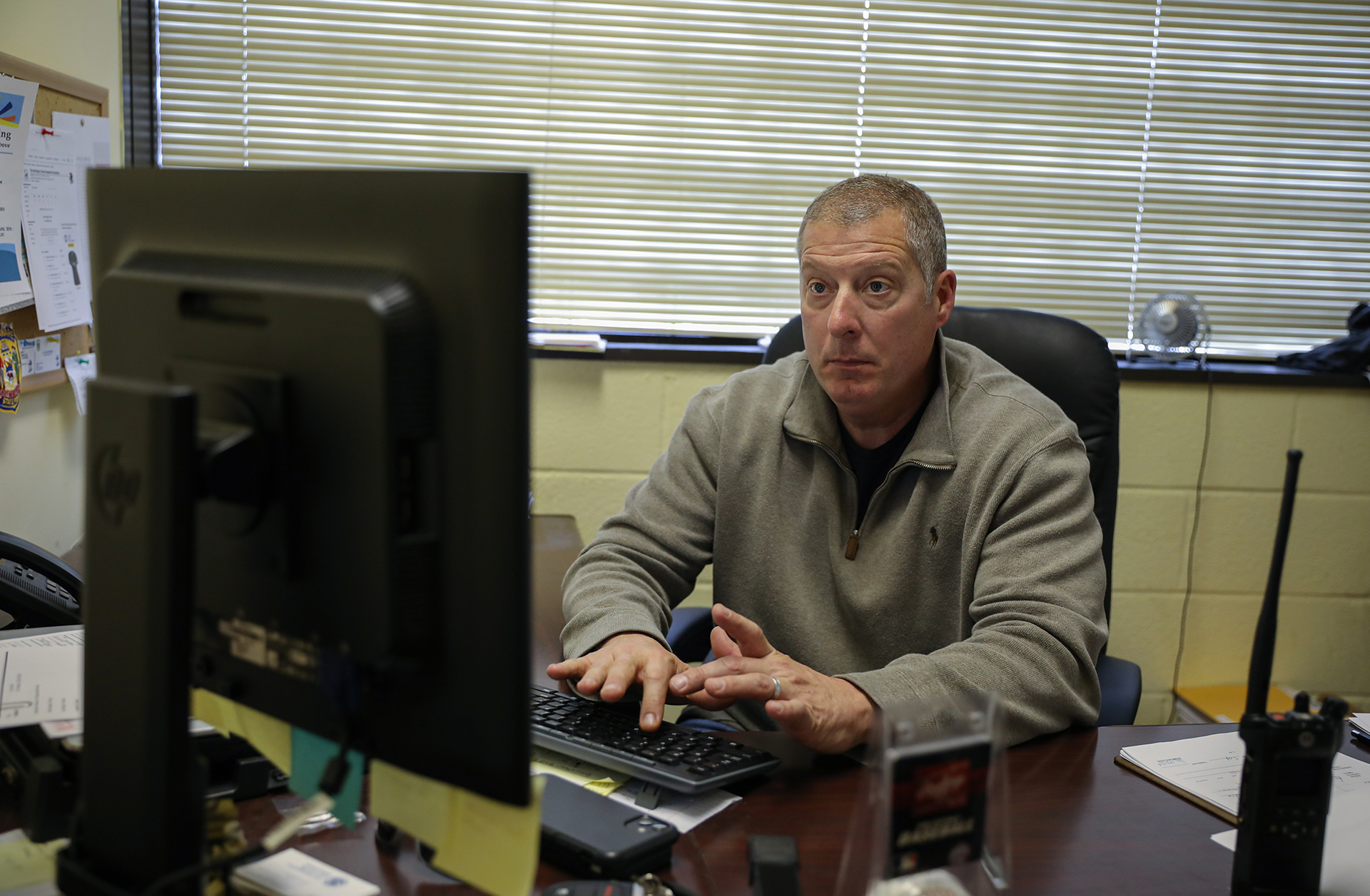 Lt. Bray McAteer, the deputy in charge of Alamance County's Special Victims Unit, inputs the name of the newest sexual offender living in the county into the state registry on Wednesday, Dec. 11. When approved, this addition will bring Alamance's total number of registrants to 395.
Lt. Bray McAteer, the deputy in charge of Alamance County's Special Victims Unit, inputs the name of the newest sexual offender living in the county into the state registry on Wednesday, Dec. 11. When approved, this addition will bring Alamance's total number of registrants to 395.According to McAteer, most local offenders have to travel to cities such as Lexington, Greensboro, Durham or Reidsville to attend classes.
Ed Dawson, a clinical psychologist with Engaging Life Psychological Services in Lexington, has been teaching one of these classes for the past 30 years.
“These classes help offenders learn about the circumstances that led to them engaging in these illegal activities. Through group sessions, they learn the importance of decision-making and how to avoid decisions that could lead them to harm others,” Dawson said. “There is a lot of focus on victims, and while that’s absolutely needed, prevention needs to start with the offenders.”
In most cases, classes are an hour long and take place once a week. To pass Dawson’s course, offenders must attend approximately 80 sessions. The cost of the course is what Dawson says keeps most registrants from reaching this goal.
Dawson’s program costs $160 a month, a price he said is standard. Despite these classes being court-mandated, the state doesn’t financially support any of the roughly 35 offenders enrolled in Dawson’s class.
On occasion, the federal government pays the bill. But since 2017, Dawson said he has only had three offenders in that situation.
“I am in favor of them having a little skin in the game because it makes them value the treatment more because they are the ones paying for it,” Dawson said. “But if the state could supplement the people financially struggling, it would allow the offender to focus on the treatment rather than the payment.”
He estimates close to 70% of offenders taking his class struggle with financial compliance.
“The reason people don’t complete the classes is because they can’t afford it. Then they’re considered within violation of the court order requiring the class, so it creates a false recidivism. It’s not recidivism based upon a committed crime,” Daughtry said. “They couldn’t afford a class that should have been free.”
According to Daughtry, most registrants struggle with finances because the public registry prevents them from finding employment and maintaining housing.
Before finding a home, registrants must check all potential housing locations with McAteer to assure they are not violating the law.
Sex offenders can’t reside within 1,000 feet of a “protected location,” such as a school, daycare, nursery or playground. Registrants charged with offenses against minors, who constitute more than half of all offenders in North Carolina, aren’t allowed to stand within 300 feet of these locations.
Marlena Islay, the director of the Geographic Information Systems Department, declined to share the protected locations in Alamance, but she did confirm that there are five sites in the town of Elon. The town is home to 12 registrants.
“I’ve had folks check five, six, seven or even eight addresses before they find one that works. A lot of the addresses that I end up checking are in bad neighborhoods because they can’t get good jobs,” McAteer said. “I mean they did do the crime, but still, sometimes you’re like, ‘Dang, they can’t seem to catch a break.’ ”
While McAteer respects the importance of these limitations when dealing with high-risk offenders, he sees a direct correlation between the housing challenges low-risk offenders face and their success after registration.
More than 91% of registrants in Alamance and North Carolina are considered low-risk offenders, meaning they are not violent predators, aggregative offenders or recidivists.
“There are some folks that come into my office that just have nowhere else to go. I’ve got … offenders struggling with homelessness. But I still got to have a place where I can go see you, whether it’s a bush, a tree or a sign,” McAteer said.
The state registry lists 268 offenders as homeless, 10 of them in Alamance.
For offenders, the difficulty in finding permanent housing is paired with lack of job prospects. McAteer said close to 80% of offenders in Alamance County struggle to find and maintain stable employment.
“If you do a background check on someone and they are an offender, it’s not a surprise that most people don’t want to work with you,” McAteer said.
A 2014 study published by the International Journal of Criminal Justice Sciences found that 36.3% of sex offenders in Indiana “were never employed since release from prison.” This subsequently raised the recidivism rate among those offenders by more than 50%.
“Our laws undermine the essential factors that help people succeed in living a law-abiding life,” said Jill Levenson, a professor at Barry University, who studies the effectiveness of social policies on reducing sexual violence. “It’s not just a name on a list. It is an eternally limiting factor for a person that is trying to live life just like everyone else. It can actually increase recidivism in low-risk offenders.”
Levenson’s study on the effects of sex offender’s laws found that most registrants had issues with job loss and threats or harassment. In the discussion of the paper, Levenson wrote that “although the public deserves to be protected from sex offenders, this should not occur at the expense of offender safety.”
“The ostracizing of sexual offenders doesn’t contribute to public safety. … This is not sympathizing with sex offenders; this is focusing on creating structures that build lives and communities. If we are concerned that somebody presents a risk, it’s more effective to create restrictions that are managed on a case-by-case basis.”
At the moment, the only difference between the way high- and low-risk offenders are treated is the number of times they receive a compliance letter from the local Sheriff’s Office. Over the course of a year, a moderate- to low-risk offender is checked in on twice, while a high-risk offender is checked in on four times.
There are currently no government-supported programs or organizations helping with criminal reintegration in Alamance County.
Sustainable Alamance is one of two non-governmental organizations in the county that offer free long-term employment assistance to felons re-entering society — regardless of their crime.
The organization, operating out of Beverly Hills United Church of Christ in Burlington, focuses on helping former criminals find and maintain full-time employment.
1. Clean drug test
2. Show up - on time
3. Be teachable
4. No drama
“If you find a place to live, you have to pay rent. If you get a car, you have to pay for gas. The economic pressures are still there,” said Phil Bowers, founder and executive director of Sustainable Alamance. “We’ve really tried to stay focused on the employment side and just do it really well.”
Bowers interviewed dozens of local employers to discover how former criminals get hired. Based on these interviews, Bowers created a set of expectations he requires of all the people he works with: “clean drug test, show up — on time, be teachable, no drama.”
According to Bowers, who is also a pastor, the organization runs under the motto: “Because you matter and because you are loved.”
“Anybody that lives in Alamance County and finds themselves in a ditch, they automatically qualify. If they come to us and they want to be with us, then they are in,” Bowers said. “We don’t ask for any other qualifications other than that. We don’t turn anyone away; that’s not for us to be the judge.”

Phil Bowers, founder and executive director of Sustainable Alamance, runs the organization out of Beverly Hills United Church of Christ in Burlington, where he is also a pastor. Photo by Anton L. Delgado.
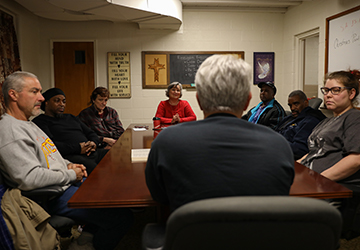
Every Wednesday evening from 5:30 p.m. to 7 p.m., Phil Bowers, founder and executive director of Sustainable Alamance, leads a Bible study session with volunteers and former criminals in the basement of Beverly Hills United Church of Christ in Burlington. Photo by Anton L. Delgado.
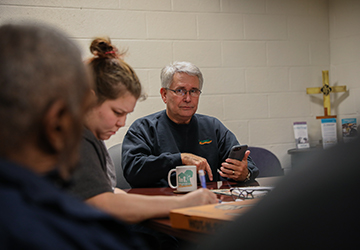
Phil Bowers, founder and executive director of Sustainable Alamance, looks up after reading a scripture verse from his phone during a Bible study session in the basement of Beverly Hills United Church of Christ in Burlington on Wednesday, Dec. 4. Photo by Anton L. Delgado.
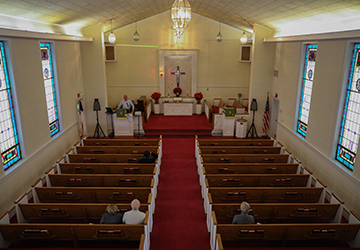
A four-person congregation listens to Phil Bowers, founder and executive director of Sustainable Alamance, preach in Beverly Hills United Church of Christ in Burlington, during an 11 a.m. service on Sunday, Dec. 8. Photo by Anton L. Delgado.
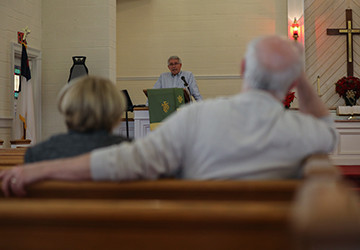
Shaun and Carol Hyndshaw, who have attended services in Beverly Hills United Church of Christ for the last 40 years, listen to Phil Bowers, founder and executive director of Sustainable Alamance, preach on Sunday, Dec. 8. Photo by Anton L. Delgado.
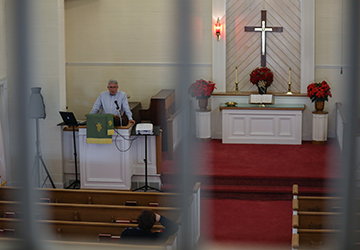
Liz Vaughan, a member of Sustainable Alamance, listens to Paul Bowers, the organization's founder and executive director, preach during her first service in Beverly Hills United Church of Christ on Sunday, Dec. 8. "The gospel to all the poor is that the old mortages of eternity are not held against us, because God has declared a general amnesty on old bills unpaid, all old counts unsettled, all old hurts unhealed, all old sins unforgiven," Bowers preached.
Three years ago, Elon University students in associate professor of economics Steven Bednar’s Economics of Poverty class conducted a cost-benefit analysis of Sustainable Alamance to create an economic impact report on the organization.
By comparing state, county and organization statistics, the report estimated that the recidivism rate among individuals working with Sustainable Alamance has been reduced by 90%.
According to the report, from 2014 to 2017, the organization created “at least $5 million in benefits to Alamance County.” For every dollar donated to Sustainable Alamance, $11.89 was returned to the community in the form of “taxes paid on wage earnings and the savings incurred due to the dramatic decrease in recidivism rates.”
Since Bowers founded the organization in 2008, he has helped place more than 75 former criminals in full-time positions. One of the hardest groups to work with are sex offenders, he said.
“These folks are radioactive in the community. Everything is stacked against them — where they can walk, where they can live, where they can stand,” Bowers said. “There are a lot of ways you can end up on the registry, and none of them are good, but it is about how each person processes what that means.”
So far, Bowers has placed six sex offenders in full-time positions, mostly entry-level manufacturing jobs. While he said he sees this as a success, several county residents have been vocal about their disdain for offenders and have criticized Bowers for working with them.
Anytime he gets an angry phone call, snide comment or inflamed letter asking why he works with offenders, Bowers said he simply refers them to an altered version of the organization’s motto — “Because they matter and because all are loved.”
“We have to believe that any life can be transformed,” Bowers said.
Eight and a half years after registration, Daughtry now works as the executive director of North Carolina’s affiliate of the National Association for Rational Sexual Offense Laws.
“We’re the most hated group in North Carolina,” Daughtry said. “People hate the crime, and so they hate the people on the other side of it as well.”
The goal of NARSOL is to see the eventual abolishment of the registry or the shortening of the minimum amount of years a registrant must spend on the list. Only after 10 years can low-risk offenders petition to be removed from North Carolina’s registry.
This year, nearly 860 low-risk offenders will have the opportunity to petition — 19 of them live in Alamance.
 A flier for the National Association for Rational Sexual Offense Laws' conference this summer.
A flier for the National Association for Rational Sexual Offense Laws' conference this summer.In two years, it will be Daughtry’s turn to petition for what he calls “a clean slate.” Daughtry says the toughest part about being on the registry for the past few years has been changing his opinion of himself.
“Turning that shame into opportunity — that’s the hardest part about being a sex offender. And it’s the hardest part about advocating for it,” Daughtry said.
Daughtry has been advocating for registrants by planning NARSOL’s 12th annual conference, which will be held in Raleigh this summer under the slogan “From acorn to oak.”
“Lawyers and judges and people that have no expertise with sexual matters are deciding the fate of people involved in sexual matters,” Daughtry said. “The people that should be talking about it are the victims and the perpetrators. But instead, we just hear about it on the six o’clock news, or the 11 o’clock news or the next day in the paper.”
By hosting a conference meant for “problem-solving and constructive conversation,” Daughtry hopes to reinforce peoples’ resolve to fight for change.
“These are not bad people,” Daughtry said. “These are bad circumstances, bad consequences, and everybody’s entitled to making a mistake.”